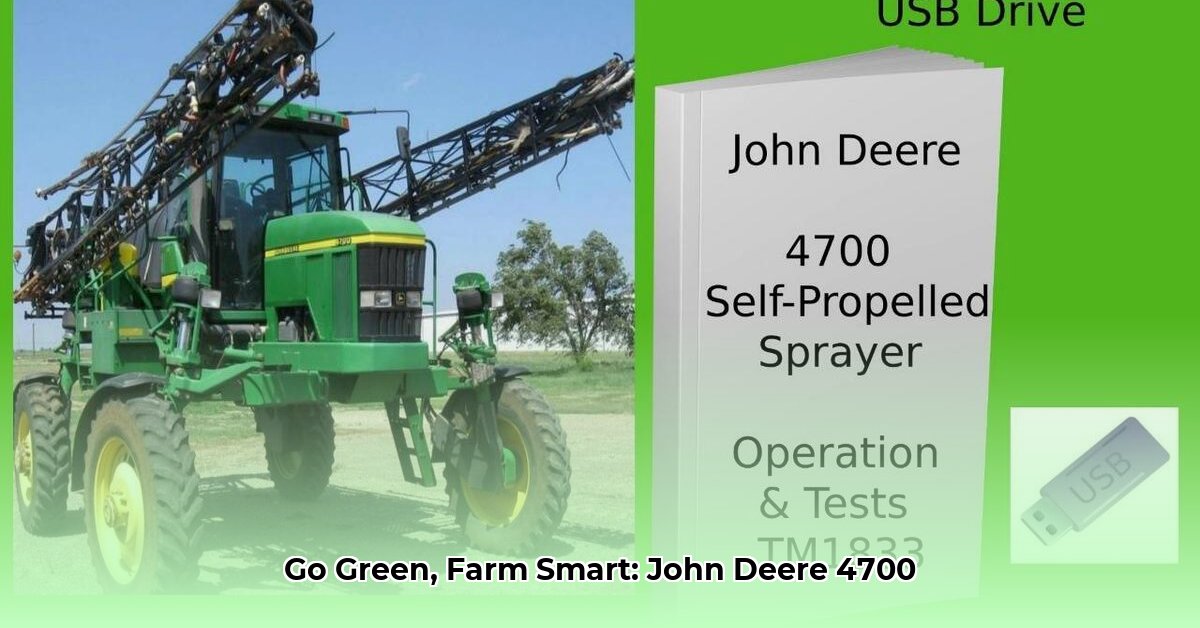
Choosing the right tractor significantly impacts a farm's environmental footprint and profitability. The John Deere 4700, a compact tractor popular among small-scale farmers, is often touted as a sustainable option. But does it live up to the claim? This in-depth analysis explores the 4700's sustainability, weighing its pros and cons to help you determine if it's the right fit for your operation. For more on smaller John Deere tractors, check out this resource.
Fuel Efficiency: A Smaller Footprint?
The John Deere 4700's smaller engine generally translates to lower fuel consumption compared to larger tractors, particularly on smaller acreages. This reduced fuel use directly contributes to lower greenhouse gas (GHG) emissions per unit of work. Think of it like choosing a fuel-efficient car over a gas-guzzling SUV; the smaller machine often accomplishes the same task with less fuel. However, the exact fuel efficiency varies based on tasks, terrain, and operator skill. Comprehensive data comparing fuel consumption across different scenarios is still needed for a definitive assessment.
Actionable Intelligence: Before purchasing, meticulously compare the projected fuel consumption of the 4700 to your current tractor's usage. Consider your typical workload and acreage to determine if the 4700's fuel efficiency will yield significant savings. Tracking your fuel use over a season can provide valuable insights into your actual needs.
Versatility and Longevity: More Than One Trick
The 4700's versatility is a significant advantage. Its compatibility with a wide range of implements allows it to perform multiple tasks, reducing the need for specialized equipment and minimizing overall machinery investment. This translates to lower upfront costs and a smaller environmental impact associated with manufacturing and disposal of multiple machines. A well-maintained 4700 can provide years of reliable service, further enhancing its long-term sustainability. But, proper maintenance is crucial to realizing its lifespan potential.
Actionable Intelligence: Before purchase, thoroughly list your farm's typical tasks. Identify the essential attachments based on this list to avoid unnecessary spending, thus reducing your footprint. Regular preventative maintenance and a dedicated repair budget are essential to maximize the tractor’s lifespan.
Fossil Fuel Dependence: The Diesel Dilemma
The 4700, like most tractors, runs on diesel fuel. While its smaller engine reduces emissions compared to larger models, its reliance on fossil fuels remains a significant environmental concern. Diesel combustion contributes to greenhouse gas emissions and air pollution, a reality that cannot be ignored. However, the environmental impact can be mitigated through efficient operation and potentially transitioning to alternative fuels when feasible.
Actionable Intelligence: Explore the availability and practicality of biodiesel or renewable diesel in your region. Investigate the cost-effectiveness and logistical challenges of switching to alternatives. Prioritize efficient driving techniques to maximize fuel economy.
Underutilization: A Common Small-Farm Hurdle
Small-scale farms often face the challenge of underutilized equipment. A tractor sitting idle represents not only a financial loss but also a missed opportunity for improved sustainability. Shared ownership arrangements with neighboring farmers, or diversifying income streams by offering custom services (e.g., tilling, mowing) can help mitigate underutilization. Careful planning of tasks and seasonal workflows are also key.
Actionable Intelligence: Conduct an honest assessment of your yearly workload to determine if the 4700 is the right size for your operation. Consider renting equipment for occasional tasks or exploring shared ownership with other farmers to maximize equipment use.
The Missing Lifecycle Assessment: A Call for Further Research
A crucial gap in evaluating the 4700's sustainability is the lack of a comprehensive lifecycle assessment (LCA). An LCA would provide a complete picture of its environmental impact across its entire lifespan – from manufacturing and transportation to use and eventual disposal. Without this data, it's difficult to definitively assess its overall environmental footprint.
Actionable Intelligence: Advocate for further research and data collection on LCAs for agricultural equipment. Support initiatives that analyze the environmental impact of tractors throughout their entire life cycle. This will allow farmers and other stakeholders to make truly informed purchasing decisions.
Conclusion: A Balanced Perspective
The John Deere 4700 presents a mixed bag in terms of sustainability. Its fuel efficiency and versatility offer advantages for small-scale farmers, but its reliance on diesel fuel and the potential for underutilization are significant considerations. Ultimately, the 4700's suitability depends on individual farming contexts and practices. A comprehensive lifecycle assessment is urgently needed to fully understand its environmental impact. Remember, sustainable farming is a holistic endeavor; the tractor is just one piece of a larger puzzle.